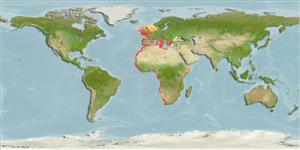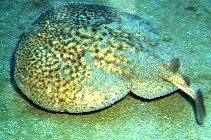把你的觀察加入 Fish Watcher
| Native range | All suitable habitat | Point map | Year 2050 |

|
| This map was computer-generated and has not yet been reviewed. |
| Torpedo marmorata AquaMaps Data sources: GBIF OBIS |
分類 / Names 俗名 | 同種異名 | Catalog of Fishes(屬, 種) | ITIS | CoL | WoRMS | Cloffa
Elasmobranchii 板鰓亞綱 (鯊魚與魟魚) (sharks and rays) > Torpediniformes (Electric rays) 電鰩目 (Electric rays) > Torpedinidae (Electric rays) 電 (Electric rays)
Etymology: Torpedo: Latin, torpere = be sluggish (Ref. 45335).
More on author: Risso.
Etymology: Torpedo: Latin, torpere = be sluggish (Ref. 45335).
More on author: Risso.
Environment: milieu / climate zone / depth range / distribution range 生態學
海洋; 半鹹淡水 礁區魚類; 深度上下限 2 - 370 m (Ref. 4430). 亞熱帶的; ? - 20°C (Ref. 10011); 60°N - 34°S, 19°W - 36°E (Ref. 114953)
分布 國家 | FAO區域 | 生態系 | 發現紀錄 | Point map | 簡介 | Faunafri
Eastern Atlantic: northern UK (less common in southern North Sea and Kattegat) to Cape of Good Hope, South Africa. Also in the Mediterranean Sea.
東大西洋: 英國北部 (較不普遍在北海南部與 Kattegat 中) 到南非好望角。 也在地中海中。
東大西洋: 英國北部 (較不普遍在北海南部與 Kattegat 中) 到南非好望角。 也在地中海中。
Length at first maturity / 大小 / 重量 / 年齡
Maturity: Lm 44.0, range 39 - 49 cm
Max length : 100.0 cm TL 雄魚/尚未辨別雌雄; (Ref. 27000); common length : 60.0 cm TL 雄魚/尚未辨別雌雄; (Ref. 114953); 最大體重: 3.0 kg (Ref. 35388)
Max length : 100.0 cm TL 雄魚/尚未辨別雌雄; (Ref. 27000); common length : 60.0 cm TL 雄魚/尚未辨別雌雄; (Ref. 114953); 最大體重: 3.0 kg (Ref. 35388)
簡短描述 檢索表 | 型態特徵 | 形態測量圖
背棘 (總數) : 0; 臀棘: 0; 脊椎骨: 104 - 108. Disc-width around the same as its length, length and width 1,50 to 1,70 times in total length; dorsal fins more or less rounded, its base 1,50 times in its height (Ref. 39215).
體盤-寬度大約等於它的長度,長度與寬度 1,50 到 1,70 倍全長; 背鰭約略圓的, 它的基底 1,50 倍它的高度.(參考文獻 39215)
體盤-寬度大約等於它的長度,長度與寬度 1,50 到 1,70 倍全長; 背鰭約略圓的, 它的基底 1,50 倍它的高度.(參考文獻 39215)
Occurs in seagrass areas, rocky reefs, and adjacent soft bottoms (Ref. 12951). Avoids temperatures above 20°C (Ref. 10011). Nocturnal, usually burying itself during the day with only the eyes and spiracle jutting out (Ref. 12382). Feeds on small benthic fishes Trachurus, Mugil, Mullus, Dicentrarchus, Spondyliosoma, Boops, Labrus, Dascyllus, Pomacentrus) and crustaceans (Ref. 10011). Females outlive males; viviparous, neonates measuring 10-14 cm at birth (Ref. 10426). Produces 2-32 pups in a litter after a 10-month gestation (Ref. 12951, Ref. 114953). Males reaches maturity at ca. 30 cm TL, females at ca. 40 cm TL; born at 10-14 cm TL (Ref. 114953). Electrocytes start developing when the embryo weighs about 1 g; electric organs functional before birth and newborns can use their electric organ discharge (EOD) in capturing prey (Ref. 10428). Can produce electric discharges of up to 200 volts; EOD frequency up to 600 Hz. Jumps on fast-moving prey, paralyzing it with its EOD (Ref. 27000).
出現於海草區域,岩礁與毗連的軟質底部。 (參考文獻 12951) 避開在 20個 ° C 上面的溫度。 (參考文獻 10011) 夜行的, 通常把自己埋藏起來在白天期間僅僅眼睛與噴水孔露出.(參考文獻 12382) 吃小型底棲的魚 Trachurus , Mugil , Mullus , Dicentrarchus , Spondyliosoma , Boops , Labrus , Dascyllus , Pomacentrus) 與甲殼動物.(參考文獻 10011) 雌性活得比雄性長; 胎生的, 幼胎體長 10- 出生時的 14 公分.(參考文獻 10426) 一胎的 5-32.(參考文獻 12951) 當胚胎重量大約 1 g 的時候,發電細胞開始發展; 出生前發電器官發揮功能與新生小魚能在捕獲獵物方面使用他們的發電器放電 (EOD) 。 (參考文獻 10428) 能生產向上到 200 伏特的電壓; EOD 頻率向上到 600個赫茲。 跳上快速移動的獵物, 麻痺它用它的 EOD 。 可能達到 100 公分長。 (參考文獻 27000)
出現於海草區域,岩礁與毗連的軟質底部。 (參考文獻 12951) 避開在 20個 ° C 上面的溫度。 (參考文獻 10011) 夜行的, 通常把自己埋藏起來在白天期間僅僅眼睛與噴水孔露出.(參考文獻 12382) 吃小型底棲的魚 Trachurus , Mugil , Mullus , Dicentrarchus , Spondyliosoma , Boops , Labrus , Dascyllus , Pomacentrus) 與甲殼動物.(參考文獻 10011) 雌性活得比雄性長; 胎生的, 幼胎體長 10- 出生時的 14 公分.(參考文獻 10426) 一胎的 5-32.(參考文獻 12951) 當胚胎重量大約 1 g 的時候,發電細胞開始發展; 出生前發電器官發揮功能與新生小魚能在捕獲獵物方面使用他們的發電器放電 (EOD) 。 (參考文獻 10428) 能生產向上到 200 伏特的電壓; EOD 頻率向上到 600個赫茲。 跳上快速移動的獵物, 麻痺它用它的 EOD 。 可能達到 100 公分長。 (參考文獻 27000)
Life cycle and mating behavior 成熟度 | 繁殖 | 產卵場 | 卵 | 孕卵數 | 仔魚
Exhibit ovoviparity (aplacental viviparity), with embryos feeding initially on yolk, then receiving additional nourishment from the mother by indirect absorption of uterine fluid enriched with mucus, fat or protein through specialised structures (Ref. 50449).東大西洋: 英國北部 (較不普遍在北海南部與 Kattegat 中) 到南非好望角。 也在地中海中。
主要參考資料
Upload your references | 參考文獻 | 合作者 : Carvalho, Marcelo | 合作者
Stehmann, M. and D.L. Bürkel, 1984. Torpedinidae. p. 159-162. In P.J.P. Whitehead, M.-L. Bauchot, J.-C. Hureau, J. Nielsen and E. Tortonese (eds.) Fishes of the north-eastern Atlantic and Mediterranean. UNESCO, Paris. Vol. 1. (Ref. 2803)
IUCN 瀕危狀態 (Ref. 130435: Version 2024-2)
次級保育類動物, 見 IUCN 紅皮書 (VU) (A2bd); Date assessed: 31 August 2020
CITES
Not Evaluated
對人類具威脅
另外地 (Ref. 4690)
人類使用
漁業: 沒有興趣; 游釣魚種: 是的; 水族館: 公眾的水族館
FAO - Publication: search | FishSource | 周邊海洋
更多資訊
Population dynamics
成長參數
Max. ages / sizes
Length-weight rel.
Length-length rel.
長度-頻率
Mass conversion
入添量
豐度
成長參數
Max. ages / sizes
Length-weight rel.
Length-length rel.
長度-頻率
Mass conversion
入添量
豐度
Physiology
Body composition
Nutrients
耗氧量
游泳類型
游泳速度
Visual pigments
Fish sound
Diseases & Parasites
Toxicity (LC50s)
Body composition
Nutrients
耗氧量
游泳類型
游泳速度
Visual pigments
Fish sound
Diseases & Parasites
Toxicity (LC50s)
工具
Bio-Quiz | E-book | 野外調查 | 長度- 頻率 Wizard | 生活- 歷史的工具 | 分布圖 | Classification Tree
| Catch-MSY |
特別的報告
下載 XML
網路資源
AFORO (otoliths) | Aquatic Commons | BHL | Cloffa | BOLDSystems | Websites from users | 檢查 FishWatcher | CISTI | Catalog of Fishes: 屬, 種 | DiscoverLife | DORIS | ECOTOX | FAO - Publication: search | Faunafri | Fishipedia | Fishtrace | GenBank: 基因組, 核甘 | GloBI | Google Books | Google Scholar | Google | IGFA World Record | MitoFish | 國家資料庫 | Otolith Atlas of Taiwan Fishes | 公眾的水族館 | PubMed | Reef Life Survey | Socotra Atlas | 樹狀分類階層 | Wikipedia: 去, 搜尋 | World Records Freshwater Fishing | Zoobank | 動物學的記錄
Estimates based on models
Preferred temperature (Ref. 123201): 10.1 - 19.2, mean 14.1 °C (based on 392 cells).
Phylogenetic diversity index (Ref. 82804): PD50 = 0.5005 [Uniqueness, from 0.5 = low to 2.0 = high].
Bayesian length-weight: a=0.01820 (0.01481 - 0.02236), b=2.93 (2.87 - 2.99), in cm total length, based on LWR estimates for this species (Ref. 93245).
營養階層 (Ref. 69278): 4.5 ±0.0 se; based on diet studies.
回復力 (Ref. 120179): 低的, 最小族群倍增時間4.5 - 14 年 (Fec=5-32).
Fishing Vulnerability (Ref. 59153): High vulnerability (60 of 100).
Nutrients (Ref. 124155): Calcium = 5.92 [0.80, 27.36] mg/100g; Iron = 0.378 [0.092, 1.074] mg/100g; Protein = 19.4 [14.9, 22.8] %; Omega3 = 0.27 [0.11, 0.65] g/100g; Selenium = 14.8 [4.2, 42.9] μg/100g; VitaminA = 63.8 [17.2, 235.5] μg/100g; Zinc = 0.555 [0.260, 1.159] mg/100g (wet weight);




